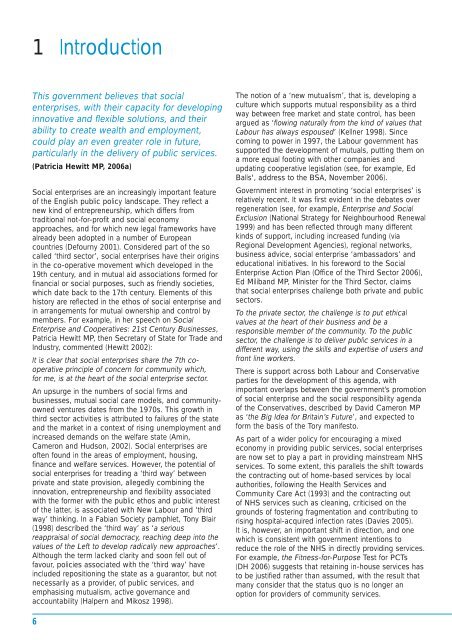Social Enterprises and the NHS - Unison
Social Enterprises and the NHS - Unison
Social Enterprises and the NHS - Unison
Create successful ePaper yourself
Turn your PDF publications into a flip-book with our unique Google optimized e-Paper software.
1 Introduction<br />
This government believes that social<br />
enterprises, with <strong>the</strong>ir capacity for developing<br />
innovative <strong>and</strong> flexible solutions, <strong>and</strong> <strong>the</strong>ir<br />
ability to create wealth <strong>and</strong> employment,<br />
could play an even greater role in future,<br />
particularly in <strong>the</strong> delivery of public services.<br />
(Patricia Hewitt MP, 2006a)<br />
<strong>Social</strong> enterprises are an increasingly important feature<br />
of <strong>the</strong> English public policy l<strong>and</strong>scape. They reflect a<br />
new kind of entrepreneurship, which differs from<br />
traditional not-for-profit <strong>and</strong> social economy<br />
approaches, <strong>and</strong> for which new legal frameworks have<br />
already been adopted in a number of European<br />
countries (Defourny 2001). Considered part of <strong>the</strong> so<br />
called ‘third sector’, social enterprises have <strong>the</strong>ir origins<br />
in <strong>the</strong> co-operative movement which developed in <strong>the</strong><br />
19th century, <strong>and</strong> in mutual aid associations formed for<br />
financial or social purposes, such as friendly societies,<br />
which date back to <strong>the</strong> 17th century. Elements of this<br />
history are reflected in <strong>the</strong> ethos of social enterprise <strong>and</strong><br />
in arrangements for mutual ownership <strong>and</strong> control by<br />
members. For example, in her speech on <strong>Social</strong><br />
Enterprise <strong>and</strong> Cooperatives: 21st Century Businesses,<br />
Patricia Hewitt MP, <strong>the</strong>n Secretary of State for Trade <strong>and</strong><br />
Industry, commented (Hewitt 2002):<br />
It is clear that social enterprises share <strong>the</strong> 7th cooperative<br />
principle of concern for community which,<br />
for me, is at <strong>the</strong> heart of <strong>the</strong> social enterprise sector.<br />
An upsurge in <strong>the</strong> numbers of social firms <strong>and</strong><br />
businesses, mutual social care models, <strong>and</strong> communityowned<br />
ventures dates from <strong>the</strong> 1970s. This growth in<br />
third sector activities is attributed to failures of <strong>the</strong> state<br />
<strong>and</strong> <strong>the</strong> market in a context of rising unemployment <strong>and</strong><br />
increased dem<strong>and</strong>s on <strong>the</strong> welfare state (Amin,<br />
Cameron <strong>and</strong> Hudson, 2002). <strong>Social</strong> enterprises are<br />
often found in <strong>the</strong> areas of employment, housing,<br />
finance <strong>and</strong> welfare services. However, <strong>the</strong> potential of<br />
social enterprises for treading a ‘third way’ between<br />
private <strong>and</strong> state provision, allegedly combining <strong>the</strong><br />
innovation, entrepreneurship <strong>and</strong> flexibility associated<br />
with <strong>the</strong> former with <strong>the</strong> public ethos <strong>and</strong> public interest<br />
of <strong>the</strong> latter, is associated with New Labour <strong>and</strong> ‘third<br />
way’ thinking. In a Fabian Society pamphlet, Tony Blair<br />
(1998) described <strong>the</strong> ‘third way’ as ‘a serious<br />
reappraisal of social democracy, reaching deep into <strong>the</strong><br />
values of <strong>the</strong> Left to develop radically new approaches’.<br />
Although <strong>the</strong> term lacked clarity <strong>and</strong> soon fell out of<br />
favour, policies associated with <strong>the</strong> ‘third way’ have<br />
included repositioning <strong>the</strong> state as a guarantor, but not<br />
necessarily as a provider, of public services, <strong>and</strong><br />
emphasising mutualism, active governance <strong>and</strong><br />
accountability (Halpern <strong>and</strong> Mikosz 1998).<br />
6<br />
The notion of a ‘new mutualism’, that is, developing a<br />
culture which supports mutual responsibility as a third<br />
way between free market <strong>and</strong> state control, has been<br />
argued as ‘flowing naturally from <strong>the</strong> kind of values that<br />
Labour has always espoused’ (Kellner 1998). Since<br />
coming to power in 1997, <strong>the</strong> Labour government has<br />
supported <strong>the</strong> development of mutuals, putting <strong>the</strong>m on<br />
a more equal footing with o<strong>the</strong>r companies <strong>and</strong><br />
updating cooperative legislation (see, for example, Ed<br />
Balls', address to <strong>the</strong> BSA, November 2006).<br />
Government interest in promoting ‘social enterprises’ is<br />
relatively recent. It was first evident in <strong>the</strong> debates over<br />
regeneration (see, for example, Enterprise <strong>and</strong> <strong>Social</strong><br />
Exclusion (National Strategy for Neighbourhood Renewal<br />
1999) <strong>and</strong> has been reflected through many different<br />
kinds of support, including increased funding (via<br />
Regional Development Agencies), regional networks,<br />
business advice, social enterprise ‘ambassadors’ <strong>and</strong><br />
educational initiatives. In his foreword to <strong>the</strong> <strong>Social</strong><br />
Enterprise Action Plan (Office of <strong>the</strong> Third Sector 2006),<br />
Ed Milib<strong>and</strong> MP, Minister for <strong>the</strong> Third Sector, claims<br />
that social enterprises challenge both private <strong>and</strong> public<br />
sectors.<br />
To <strong>the</strong> private sector, <strong>the</strong> challenge is to put ethical<br />
values at <strong>the</strong> heart of <strong>the</strong>ir business <strong>and</strong> be a<br />
responsible member of <strong>the</strong> community. To <strong>the</strong> public<br />
sector, <strong>the</strong> challenge is to deliver public services in a<br />
different way, using <strong>the</strong> skills <strong>and</strong> expertise of users <strong>and</strong><br />
front line workers.<br />
There is support across both Labour <strong>and</strong> Conservative<br />
parties for <strong>the</strong> development of this agenda, with<br />
important overlaps between <strong>the</strong> government’s promotion<br />
of social enterprise <strong>and</strong> <strong>the</strong> social responsibility agenda<br />
of <strong>the</strong> Conservatives, described by David Cameron MP<br />
as ‘<strong>the</strong> Big Idea for Britain’s Future’, <strong>and</strong> expected to<br />
form <strong>the</strong> basis of <strong>the</strong> Tory manifesto.<br />
As part of a wider policy for encouraging a mixed<br />
economy in providing public services, social enterprises<br />
are now set to play a part in providing mainstream <strong>NHS</strong><br />
services. To some extent, this parallels <strong>the</strong> shift towards<br />
<strong>the</strong> contracting out of home-based services by local<br />
authorities, following <strong>the</strong> Health Services <strong>and</strong><br />
Community Care Act (1993) <strong>and</strong> <strong>the</strong> contracting out<br />
of <strong>NHS</strong> services such as cleaning, criticised on <strong>the</strong><br />
grounds of fostering fragmentation <strong>and</strong> contributing to<br />
rising hospital-acquired infection rates (Davies 2005).<br />
It is, however, an important shift in direction, <strong>and</strong> one<br />
which is consistent with government intentions to<br />
reduce <strong>the</strong> role of <strong>the</strong> <strong>NHS</strong> in directly providing services.<br />
For example, <strong>the</strong> Fitness-for-Purpose Test for PCTs<br />
(DH 2006) suggests that retaining in-house services has<br />
to be justified ra<strong>the</strong>r than assumed, with <strong>the</strong> result that<br />
many consider that <strong>the</strong> status quo is no longer an<br />
option for providers of community services.















